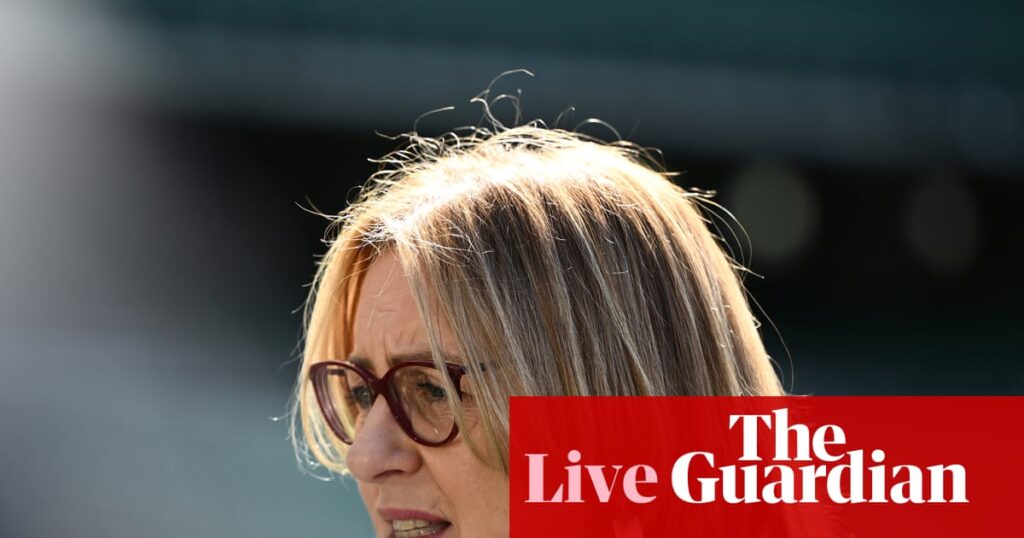Terminally ill Victorians will be able to access voluntary assisted dying earlier under new changes

Benita Kolovos
Terminally ill Victorians will be able to access voluntary assisted dying earlier under changes to the state’s once nation-leading legislation to be introduced to parliament today.
The premier, Jacinta Allan, and the health minister, Mary-Anne Thomas, are holding a press conference to announce the changes to the Voluntary Assisted Dying Act, which include expanding the eligible timeframe for all terminal diagnoses from six to 12 months.
A “gag clause” that stopped doctors from initiating conversations about voluntary assisted dying with patients will also be lifted, as will the legislation’s ban on non-Australian citizens and non-permanent residents from accessing the scheme.
The changes follow an independent review of Victoria’s assisted dying laws released in February. The review found Victoria, which was the first state in Australia to pass VAD laws in 2017, had become a “more conservative model” when compared with other states that followed.
Allan says:
We’ve looked carefully at what’s going on in other states and understood. There were areas of improvements that can – and in the view of the minister and I – must be made. These are sensible, practical changes that give people compassionate and clarity as to how they can access voluntary assisted dying here in Victoria. It does bring our system in line with operations in the rest of the country.
Key events
Federal environment minister Murray Watt said:
South Australians have a strong connection to their coast, and this Summer Plan will back locals and encourage them to get out and about in the warmer weather.
We’re delivering funding for the science and environmental measures to help marine life recover, and ensure South Australia is at the forefront of our country’s algal bloom research.
We’re tackling this algal bloom outbreak from all angles, and will continue to work closely with the Malinauskas Government to deliver what’s needed.
SA premier Peter Malinauskas said:
This is a comprehensive $100 million plan to protect our environment, support coastal businesses and communities and ensure South Australians can enjoy their summer.
Together with the Commonwealth, we’re pulling all levers available to governments to help the state respond to the algal bloom. And, we’ve undertaken significant consultation with experts, industry and the broader community.
This plan isn’t just about responding to a challenge, it’s about ensuring our coastline remains vibrant this summar and for years to come.
Federal Labor to release $102.5m plan to manage algal bloom off SA coast
The federal government is today releasing a much more comprehensive algal bloom plan to protect South Australia’s coast than one the one from the state government we saw earlier.
We’re expecting a press conference soon but a statement has come through about the $102.5m Algal Bloom Summer Plan, jointly funded by the Albanese and Malinauskas governments.
They want the plan to advance research and protect the environment, while also ensuring South Australians can enjoy their summer and support coastal businesses and communities.
It includes $17.3m for science, research and monitoring, including real-time oceanographic water quality monitoring and forecasting through “state-of-the-art monitoring buoys”, offshore water analysis to understand the link between offshore and onshore bloom distribution and movement, and a $1m trial of “state-of-the-art AI-powered submersible cytobots” to build understanding of phytoplankton communities.
It will also see new limestone native oyster reefs constructed along the coast, additional community recycled oyster reefs, seagrass restoration research and targeted breeding, conservation and fish stocking programs for vulnerable and threatened species affected by the algal bloom.
This is in addition to measures covering the other two key objectives, including investing more than $16m in ensuring South Australians can enjoy their summer, including more beach patrols and clean ups, as well as support for other community facilities and businesses.

Henry Belot
Greens senator alleged Nacc commissioner’s defence ties damage public confidence
The Greens senator David Shoebridge has alleged the head of the national anti-corruption commission’s ongoing links to the defence force have undermined trust in the watchdog and brought it into “disrepute”.
During senate estimates hearings last week, the office of the inspector-general of defence confirmed commissioner Paul Brereton had consulted for it on 11 occasions since becoming the head of the watchdog.
Brereton is a former assistant inspector-general of defence and led the inquiry into alleged war crimes in Afghanistan. He remains a member of the reserves with the major general rank. According to the ABC, he has attended several defence functions in uniform since becoming chair of the Nacc.
Shoebridge has told a conference organised by the Centre For Public Integrity that the Nacc has not been transparent about Brereton’s assistance to the inspector-general of defence. He said the commissioner’s links to the defence force were a bad look, if not a direct conflict of interest.
When you can see this ongoing relationship and connection between the chief commissioner of the national anti-corruption commission and its major customer, the Australian Defence Force … I think that does bring the Nacc into disrepute.
My focus is on public confidence and public perception. I could be persuaded that it’s fine. The inspector [of the Nacc] could be persuaded that it’s fine. The prime minister and every politician could be persuaded that it’s fine. But the real ultimate test is the public. We are doing this so they can have confidence that corruption is being rooted out … without concern for prior relationships and ongoing connections.
The Nacc was contacted for a response to Shoebridge’s criticism.
Chalmers speaks about super changes
The treasurer, Jim Chalmers, is speaking in Brisbane about the super changes he announced unexpectedly yesterday. There’s not much he’s saying that we haven’t already reported.
The prime minister and I have been discussing this for some time, we agreed the changes that are recommended to the expenditure review committee on Friday when he was there.
I got the cabinet to agree them in his absence on Monday yesterday and I thought the best thing was to announce those changes more or less as soon as the cabinet had agreed on my recommendation and so I fronted up yesterday, confronting up ever since to explain this changes which represent meaningful and substantial tax reform to make a superannuation system stronger, fairer and more sustainable.
The reason for the press conference is apparently the treasurer has wanted the changes to literally pass the pub test:
The new element – which we are here talking with Sasha, Jared and Chuggy at the Paddo – which is to get an even better outcome for Australians on low incomes. We should not lose sight that the genuinely new bit of what was announced yesterday in addition to the practical changes we made to the implementation of our better targeted superannuation tax concessions is a much better outcome for Australians on low incomes, that’s what I’m here to talk about.
In case you’re wondering, the Paddo is a well-known Brisbane pub, and Chuggy runs it.
Terminally ill Victorians will be able to access voluntary assisted dying earlier under new changes

Benita Kolovos
Terminally ill Victorians will be able to access voluntary assisted dying earlier under changes to the state’s once nation-leading legislation to be introduced to parliament today.
The premier, Jacinta Allan, and the health minister, Mary-Anne Thomas, are holding a press conference to announce the changes to the Voluntary Assisted Dying Act, which include expanding the eligible timeframe for all terminal diagnoses from six to 12 months.
A “gag clause” that stopped doctors from initiating conversations about voluntary assisted dying with patients will also be lifted, as will the legislation’s ban on non-Australian citizens and non-permanent residents from accessing the scheme.
The changes follow an independent review of Victoria’s assisted dying laws released in February. The review found Victoria, which was the first state in Australia to pass VAD laws in 2017, had become a “more conservative model” when compared with other states that followed.
Allan says:
We’ve looked carefully at what’s going on in other states and understood. There were areas of improvements that can – and in the view of the minister and I – must be made. These are sensible, practical changes that give people compassionate and clarity as to how they can access voluntary assisted dying here in Victoria. It does bring our system in line with operations in the rest of the country.
Parramatta council sacks CEO
The City of Parramatta has announced it will “part ways” with its chief executive, Gail Connolly, “effective immediately”.
In a statement today, the council announced it voted to depose Connolly at its council meeting last night.
The City of Parramatta lord mayor, Martin Zaiter, said:
Since joining in March 2023, Ms Connolly PSM has led the delivery of a number of significant projects and initiatives for the City of Parramatta.
I would like to assure our community and ratepayers that our Councillors, executive team and staff remain committed to delivering on our services and commitments and making the City of Parramatta the best place to live work and play.
Executive director of city services and projects, George Bounassif, will take on the role of acting chief executive during the recruitment process.
Prodded by a reporter, Wells acknowledges that perhaps “grateful” is not the best word to describe how kids feel about these laws.
She said:
I think the gratitude is this law applies to everybody and everybody will face the same cultural expectations kids are not online at a social media accounts between the ages of 13-16. The sense everyone will be facing a new world and everybody will have to talk to each other face-to-face as they used it was also a good thing whereas you also ask those thinkers they will be able to tell you about harms that they or their friend has experienced online as well.
Communications minister announces ad campaign for under-16s social media ban
The communications minister, Anika Wells, has been speaking to the media in Melbourne, announcing a national advertising campaign for the government’s social media ban for teens.
That ban will come into effect on 10 December on platforms including Facebook, Instagram, Snapchat, X and YouTube. The campaign will feature on billboards near schools, on TV, online and on social media.
Of that, Wells said:
[Kids] will see [the campaign] on TV, online, ironically on social media because until December 10 it is legal for kids to be on social media. If that is where they are, that is where we need to talk to them about what this means and why we are doing it.
Wells continued:
The vast majority of students I speak to are happy and grateful for these laws are coming in. That’s not the case for everybody. We are particularly attuned to the fact that people who are 13, 14, 15 are having something taken away, rather than kids who are under 13 who will just meet the new law as it exists.
Also for kids who are 16 or over who may be suffering harm online but won’t actually have their account taken away, we are cognisant of that and are working through that and occasions like today are opportunities to ask kids, particularly those aged between 13 and 16, if there is anything we have not considered that we should be considering and anything that we might not be doing that we should be doing.
Matilda Boseley sports homemade pelican outfit to talk bird of the year on ABC
Guardian Australia’s Matilda Boseley and her incredible homemade pelican costume made an appearance on ABC TV News Breakfast this morning to talk about the final day of voting for bird of the year. If you’ve never seen a pelican in mourning, you can rectify that now:
Did I mention it was the final day of voting for bird of the year? Go and vote! May the best bird (the tawny frogmouth, ahem) win!
Venezuelan embassy in Australia to close
Venezuela will close its embassy in Australia, along with its embassy in Norway, and open new ones in Burkina Faso and Zimbabwe as part of a restructure of its foreign service, Reuters reports.
The restructure comes after weeks of growing tensions with the US. The closures are part of a “strategic re-assignation of resources”, Venezuela’s government said in a statement, setting up new embassies in “two sister nations, strategic allies in the anti-colonial fight and in the resistance against hegemonic pressures.”
Consular services to Venezuelans in Norway and Australia would be provided by diplomatic missions, with details to be shared in coming days, the statement said.
The announcement occurred just days after the Nobel committee in Oslo announced that Venezuelan opposition leader Maria Corina Machado had won the 2025 Nobel peace prize for fighting for democracy in the South American country. Machado dedicated the prize to the US president, Donald Trump.
Venezuela has called on the United Nations for support over several deadly US military strikes on vessels off its Caribbean coast, which Washington alleges were carrying drugs. Some US allies on the UN security council called for de-escalation and dialogue.
Venezuela has said it is in a situation where it is rational to expect an armed attack against the country in the short-term, and President Nicolas Maduro has alleged the US is seeking a change in government.
Washington has not responded to this accusation, but has called Venezuela’s socialist leader the illegitimate head of a narco-state. The US also has announced a new counter-narcotics taskforce in its Southern Command, a military branch that oversees Latin America.
Read more on the closure of the embassy in Norway:
Australian ETF industry surges past $300bn milestone
Australia’s exchange traded fund industry has surged past $300bn in funds under management, a new record in a year full of them, AAP reports.
Australia’s ETF industry had $309.3bn in funds under management at the end of September, up $9.9bn, or 3.3%, from a month ago, Australian ETF issuer Betashares said in a report.
The Australian ETF industry has grown by $63bn since the start of the year, thanks to investment growth and $37bn in net inflows, Betashares said.
Betashares is now predicting the Australian industry could hit $320bn by year-end and $500bn by the end of 2028 – two years ahead of its previous forecast.
Betashares chief executive Alex Vynokur said:
We’re witnessing a structural shift in how Australians invest, with ETFs increasingly becoming the vehicle of choice for building diversified portfolios.
ETFs are financial instruments that trade like shares on stock exchanges like the ASX, but offer exposure to a basket of underlying assets such as stock market indexes, commodities, cryptocurrencies or investment themes.
Vynokur said investors and financial advisers were embracing them because of their ease of access, transparency and cost-effectiveness.
Adrian Neiron, chief executive and managing director of VanEck Asia Pacific, said Australia’s ETF industry was scaling at pace:
It took 21 years to reach the first $100bn in assets, a further three years to reach $200bn, and only 15 months to reach $300bn.
VanEck predicts that the industry will grow at a 20 per cent compound annual growth for the next five years, surpassing $750bn by 2030.
A Vanguard ETF that invests in 1,320 of the largest companies around the globe received the most inflows in September, at $257.2m, VanEck said.
Close behind, with $246.4m in net flows, was an iShares ETF that tracks the US S&P500 index.
Despite their strong growth, Betashares said that ETFs still represent around only 6% of the broader managed fund industry in Australia, so there was significant headroom for further adoption.

